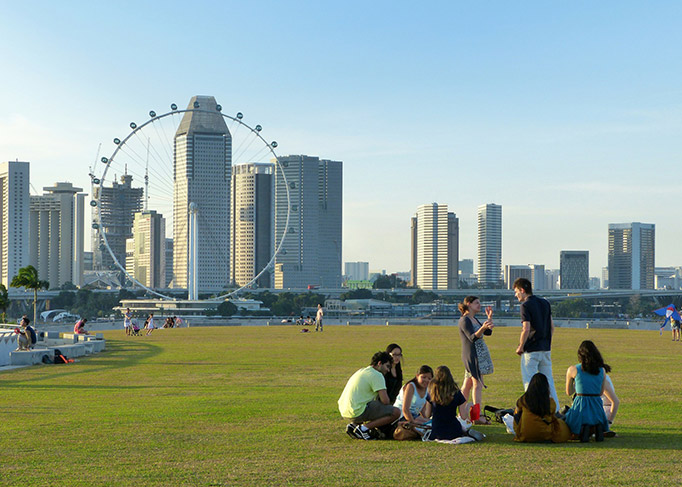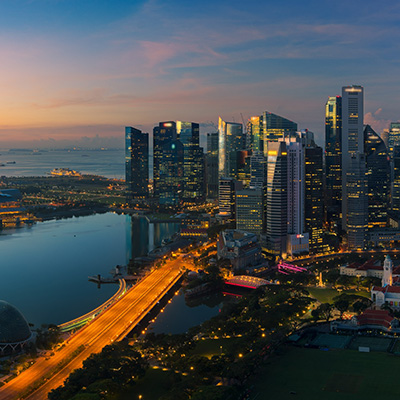Open and connected
Singapore is located geographically in the heart of Asia and its infrastructure connects to every corner of the globe, both East and West. The JLL study showed, for example, that China's cities were most connected to Singapore, followed by New York and Sydney. The city-state has managed to become enmeshed in the world’s complex value chains because its institutions have promoted transparent and consistent rule of law, and its policymakers have been successful in earning the trust of multinational businesses, NGOs, and governments. This has become a virtuous cycle, particularly as Singapore’s governmental institutions continue to engage in open-sourced, mutually beneficial, public-private-partnerships. Singapore's policymakers routinely invite foreign firms to participate in problem solving and capacity building exercises.
Free trade agreements (FTA)
Despite Singapore’s tiny market size, with a population of just over 5 million, it has implemented 22 bilateral and regional FTAs and has recently concluded and signed two mega-FTAs including the European Union-Singapore Free Trade Agreement (EUSFTA) and the Comprehensive and Progressive Trans-Pacific Partnership (CPTPP). Both the EUSFTA and CPTPP multilateral deals have high standards for promoting digital trade and the platform economy.
This effectively opens up all of the world’s major markets to Singapore-based enterprises, which is all the more compelling as the US-China trade war shows no sign of abating. In order to qualify for these FTAs, regional value chains can be rerouted to Singapore, where there are robust supplier networks and a critical mass of strategic partners and service providers.
Digital trade and data friendly
China’s Cyber Security Act, which came into force in 2017, requires foreign firms to store data on locally based servers, thereby ceding full data access to Beijing's bureaucrats. Singapore, on the other hand, has no such constraints. Within ASEAN — while other countries are erecting more barriers to cross-border data flows — Singapore has become a driving force behind the ASEAN-Australia Digital Trade Frameworks Initiative, which aims to put in place formal legal frameworks and standards for e-commerce, digital money, IP protection, and data management. Singapore’s current National Trade Platform already provides a world-class prototype for connected businesses by linking importers, exporters, banks, logistics firms, customs, shipping agents, and other stakeholders all in a transparent, open-sourced environment.
Human capital and talent
Singapore’s cash-flush policymakers are turning the city's labour pool into one of the world’s most tech-savvy workforces. The government has allocated S$19 billion (US$13.8 billion) under the Research, Innovation and Enterprise 2020 Plan (RIE), which is promoting a focus on advanced manufacturing and engineering, the digital economy and services, health and biomedical sciences, and urban, sustainable solutions. These well-funded efforts involve robust collaborative networks that include Singapore’s world-class universities, leading multinational business and a rapidly growing ecosystem of startups, business incubators and venture capitalists. Also embedded in these networks are the world’s top advisory, legal, accountancy, and IT firms, which make up Singapore’s thriving international business community and are indispensable to capacity building.
Geopolitical safe haven
Beyond the risks of tariff wars is an even bigger overarching reality: the intensifying US-China geopolitical rivalry. As Washington steps up efforts to counter Beijing’s capacity building in key technology sectors, American and foreign tech companies face new constraints. Partnering with a black-listed entity, for example, could expose a company to blocked business deals, increased export controls, technology licensing, and sanctions — all of which wreak havoc on day-to-day supply chain activities. Multinational firms, therefore, must increasingly ring fence strategic technology ecosystems in order to comply with sanctions and national security regulations. Singapore, which has in place its own framework of export controls and licensing protocols based on Western rules frameworks, provides a good fit for foreign firms looking to manage export controls.
All of these amounts to what looks to be a growing influx of tech firms into Singapore.
Alex Capri works with the world's thought leaders in business, public policy, and civil society, in the areas of global value chains, sustainable capitalism and international trade. His focus is on disruptive technology and the digital economy. Before becoming an academic, he was a partner with KPMG, a global consultancy, as well as an international trade specialist with the United States Customs Service. He did his graduate studies at the London School of Economics.
Alex is currently a Senior Fellow at the National University of Singapore, where he teaches in the business school and in the Lee Kuan Yew School of Public Policy.
This article first appeared on Forbes.








